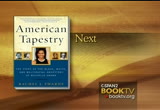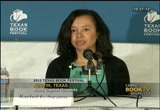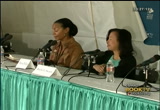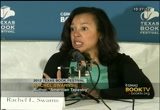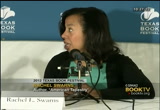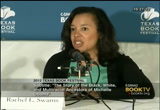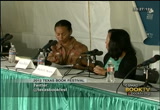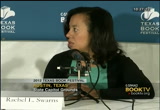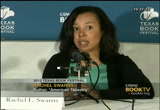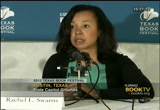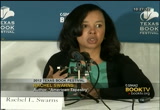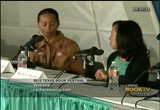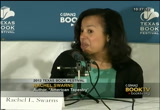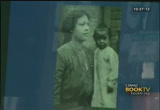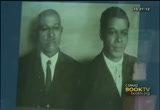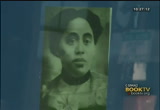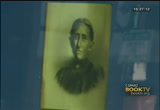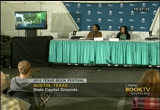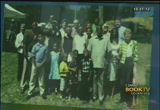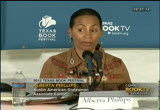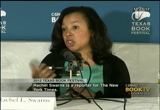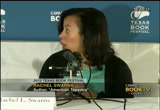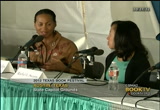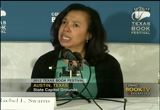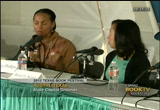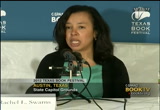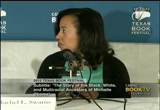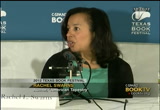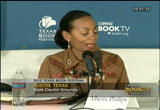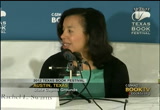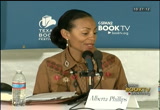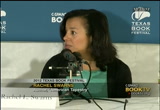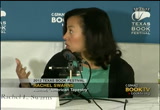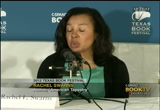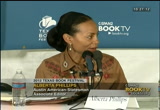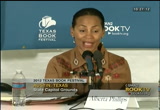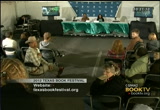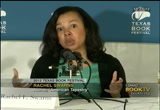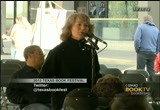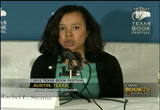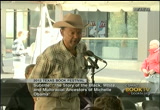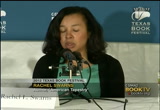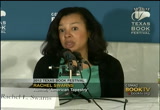tv Book TV CSPAN February 17, 2013 7:00pm-7:45pm EST
7:00 pm
he said, "of these include an unknown number of casualties and death, billions of dollars spent, greatly disrupted oil supply and increased come a war possibly widened to israel, turkey or other allies, the possible long-term occupation of iraq, increasing the stability in the persian gulf region, long-lasting era of american m. mehdi and a possible return to american isolationism, end of quote. ..
7:01 pm
7:02 pm
minutes. >> good morning. or is busy in texas, hi, y'all. it is a great day to be innd austin, texas and today had thea honor pleasure to be at the texas book festival serving as your moderator for "new york times" writer and author, raches swarns. i am going to tell you just a few things about rachel because i know you came to hear her ande not me and because our time is n limited.d she has worked for "the new york times" since 1995, reporting on domestic policy, national politics, immigration, the presidential campaign of 2004 n 2008 and our first lady, michelle obama and her role in the obama white house. i met rachel at a very different event this year, where i bought a book, the book she wrote,
7:03 pm
"american tapestry: the story of the black, white, and multiracial ancestors of michelle obama". after hearing her talk, i bought six more copies. i bought them from my family members to give as christmasrisa gifts. after having read her book i ca tell you it was a goodha investment. it taught me better understand my own family's roots and theyss many mysteries surrounding my own family.wn f rachel swarns' book is a compelling story that at times stirs deep emotions, but it's alsot a story about liberates,r and shields. but that, let's look on rachel swarns. rache swa [applause] >> thank you, thank you. >> thank you for coming.eadip ct the years leading up to thepe present on selection, the focus s ots and hi barack obama and his family and the fact he is
7:04 pm
his autobiography. now in your book, "americanamer tapestry," you put the focus on michelle obama. tell us how you got started doing that started doing that and what inspired you. >> i was writing about the first lady and the first family for the new york times which was something of an unusual assignment. typically the first family is covered by the white house reporters who chased the president around on air force one and in the briefing room and write about the first lady or first family when they have time that there was a sense in 2008 at the new york times and other newspapers too that we might want to do things differently and this first african-american family living in this house, this white house bill in part by slave labor, with slave labor would be written about regeneration to come and we
7:05 pm
wanted it to be part of documenting and chronicling that story. in january, before the inauguration, one of my colleagues was writing an article about the president and his rainbow family and we realize that the last minute we didn't know much about michele obama's ancestry. my colleague reach out to genealogist and asked her to do some digging. we didn't give her enough time. she didn't find it very much as we read a lovely story about the president and his rainbow family and we thought that was that. but unbeknownst to us the genealogists kept digging and in september of 2009, the first year the obamas were in the white house she called us back and said i found something really interesting. would you be interested in covering it? i found myself on a plane to birmingham, alabama, where i visited churches, spent time in
7:06 pm
the archives, tried to find out as much as i could about the first lady's great-grandfather who happened to be by racial and the story ran a month later on the front page of the new york times about the office's parents, millennia, the first lady's great great great grandmother who was the slave girl valued at $475 in 1852 and the first lady's great, great grandfather who was a white man whose identity was a mystery. the day after the article ran, an editor sent me an e-mail and said that was fascinating. a little snippet of the first lady's family tree. would you think of doing a book on the old thing and that is how i got started. >> we are glad you got started
7:07 pm
on the book because it opens up a lot of information about families across america and the interconnectedness of many families. what i like about your book is it reads like a good suspense mystery or thriller. i suppose you had to be part detective and part researcher in unraveling the story. even michele obama herself was unaware of some of the people in her family tree, both black and white. there are many families in america who are experiencing that same thing or who are unaware of their family tree and what that has hidden inside of it. i found the following passage insightful and -- which is also great prose and by wanted to read it. she never discussed who he was
7:08 pm
or what happened between them. whether she was a victim of his brutality or a mistress, he treated affectionately, war whether she was loved in return. she went her way and he went his. and just like that, their families split down the middle. children, grandchildren and great-grandchildren, some black, some white and some in between scattered across the country as decades past, separated by the color line and a family's fierce determination to step beyond its painful truths in slavery. obviously your research surprise and probably stunned both sides of the family. tell us about at and how michele obama's family and the white side of the family reacted to the news. >> the first lady has long
7:09 pm
suspected she had white ancestors in her family tree, like many african-americans do. but she had no idea who they were or where they lived for when they -- where and when they fit in her family's story. so i was able through dna testing to solve that mystery in her family. what i did was trace the descendants of mill the knee at's owners who lived in south carolina and georgia, irish-american families. the first lady's family. i tested them and in fact it is the most ordinary of american stories. the white shields and black shields are related. this is on the first lady's mother's side. her mother is marion shields.
7:10 pm
many americans are making these discoveries with dna testing, just finding these connections through ancestry.com, doing their own genealogy. it is a kind of discovery that many americans are making but it is not an easy one for people. on both sides of the family, this was a hard realization, even though people know these things happen. many members of the first lady's white extended family had no idea their ancestors had known slaves and while many people might like a connection to the white house, this was a most unsettling connection to the white house as you can imagine. it is not something most people expect, to have a reporter not on your door and say one of your ancestors may have owned the
7:11 pm
first lady's ancestors. and some people simply didn't want to talk about it. but some people were willing to grapple with the history and said it would not be what i would have chosen for myself but it is my history even if it is hard history. so some of the white descendants, distant cousins of the first lady went on this journey sharing their memories and records and dna as they explored what happened more than 100 years ago. it was also difficult too for the black side of the family because michele obama's uncle talked about the silence among african-americans, about him trying over and over again to get his elders to talk about what they knew about slavery and what they knew about the different colors in the family and where the white ancestry
7:12 pm
came from and over and over again people refused to talk about it and it is one of these things that is hard for people to talk about even though it resonates still, this experience -- we think it is consigned to history books but it is part of our history. so getting people to talk and wrestle with this is not an easy thing. >> i can imagine. as you say, some people were ok with it and cooperated, and some weren't okay with it. and didn't cooperate. i found that to be very interesting, reading the book, how both sides incorporated that into their histories and both sides response to that were similar and different. i enjoyed writing the new york times article that you wrote because some of the photographs
7:13 pm
were in that article and you could actually see how people on both sides of the family, black-and-white, resembled one another. >> that was one of the things before the dna test results came out. some of the first lady's distant cousin didn't know they were distant cousin then but they were appearing at the photos of the office shields and ancestors, holding them side by side saying -- they were kind of -- i didn't reveal to them the dna results until the very end but by then they were not surprised. >> do we have some photographs to show today? >> we do have some photographs. we will flip through them. >> this is the first lady as a baby with her nuclear family. term mother and her father and her brother.
7:14 pm
this is joan triples, one of the first lady's distant cousins who were willing to go on this journey and shared with me what she knew about the family and her dna as well. this is the great granddaughter of dolphins shields. [inaudible] >> this is a question that just came from the audience. when we are talking about millbeena and her biracial son, what time period we are talking about. this is pearl. nilbeena was remarkably well in life and i was able to interview two people who knew her which is astonishing but she lived until
7:15 pm
1938 and i found two people who knew her in the last years of her life. golf, her son, born in 1959-1861, he also live the remarkably long life. he died in 1950 and i was able to find three people who knew him as well. this is his daughter who move from birmingham to cleveland, ohio. this is dolphus shields, the first lady's great great grandfather with his son willie. he was biracial as i mentioned and quite a remarkable man in his own right. he was born into slavery in george and moved to birmingham, alabama as a young man where he became quite a notable person. he became a property owner in 1900. he was a carpenter and had his own business. he was a founding member of two churches that stand today and
7:16 pm
still open and running today. when he died the news of his passing was on the front page of the black newspaper. another photo of dolphus shields, dolphus with his extended family. the tombstone of the man who owned millvinia, the tombstone of his son charles, marion shields to the testing suggest was most likely dolphus's father. this move to michelle ng obama's father's side of the family, michelle obama's and and this is steve johnson, the first lady's great-grandmother who traveled to four cities, she was a sharecropper's daughter born in 1879 and somewhere along the way
7:17 pm
she decided she did not want anything to do with the farming life and she was one of the first of michele obama's and sisters to set site on chicago in 1908. this is her husband who was a minister who also lived in chicago. this is the first lady's great great grandmother, and she arrived in illinois some time in the 1860s. the first lady describes herself as a south side girl but the family had no idea their roots in illinois go that far back. if you look at mary, you will understand why the family story says she was part cherokee. she obviously has a mixed lineage but i was never able to establish for sure whether that
7:18 pm
was true. this is the first lady's grandfather, a mislabeled slide, who left south carolina and arrive in chicago around 1931. this is millvinia, the owner of millvinia's brother. this is a photo, this is an amazing coat, there is a nice story behind this one. after the book was published and after an article about the book came out, i got an e-mail from a woman who said i think that might meet my family, my husband's family and i think we have a photograph of them and in fact they did and it was the first photograph that i was able to find of millvinia's owner and his family, the shields family.
7:19 pm
millvinia's owner, henry shields is the older man with the beard and dolphus's father is the well-dressed man with the spectacle standing looking into the distance. it is a remarkable finding. i felt privileged to see it. i will skip to the last one. this is another remarkable moment which was after the book came out clayton county, ga. where millvinia was enslaved your active a monument to commemorate her life and they invited some of her descendants and that the most -- the last moment i thought some of the shields descendants might come and they did and the descendants of a slave and slave owner exchanging numbers, sharing a meal together. i don't know if they will be facebook friends for years to come but it was something to
7:20 pm
see. >> a great slide show. all of the people you mentioned are covered in the book. they all are characters in the book and one thing i found helpful was you do have a chart of michele obama's family tree, you can always look back and say this is how that person relates back to michele obama. but another thing i find interesting about your book is when we talk about slavery in this country we often talk about it as something only of the wealthy class. in other words if you were wealthy afford slaves and if you were a working-class american you didn't really have slaves. you referenced thomas jefferson and sally hammons as kind of an
7:21 pm
example of a wealthy family that owned slaves. butting your book, you bust that miffed because millvinia was a slave of a working-class american, can you talk to was a little bit about that? >> many of us when we think about slavery think about the jeffersons, we think about gone with the wind, the grand manner, the vast plantation. michele obama's family, there were ancestors of hers who had that kind of history, the plantations of south carolina. the family story does expose the enormous variation of life during slavery when -- which is not something we often think about. the shields family that owned millvinia they were not wealthy people at all land in some ways that was astonishing to the
7:22 pm
descendants who said to me we heard those shieldses never had two nickels to rub together. they were not wealthy family. the irish-americans who came some time in the 1700s, worked the land with their own hands, all we ended up owning slaves, shields married the daughter of a wealthy man. when that man with his father-in-law died inherited three slaves. the first lady's great great grandmother and she ended up in a rough rural community in georgia, the vast majority of people were not slave voters, white men worked the fields along the slaves they own if they owned annie and it was quite a different experience than the one we often think about. >> it was quite a different experience and i really enjoyed
7:23 pm
reading about the people of that day, how she worked the fields and the men who owned her worked the fields. i know that you were not able to determine the relationship between millvinia and the men who owned her. and i also know, code of silence. she never talked about it and her descendants never talked about it. i noticed the same thing in her own family and other families as well. it is about wilkerson who wrote about the great migration, the same code of silence in her family. what is up with that code of silence? >> this is a painful chapter of
7:24 pm
american history for many families. so i think at the time, people knew. it would have been very clear to people. the people i met and interviewed who knew millvinia and knew her son knew that she was a dark skin african-american woman who was born into slavery, had these very fair skin sons and no father, no husband around. they suspected but no one talked about it. people who knew dolphus shields suspected his great granddaughter said people whispered in the family that he had a white father but it was again something people just didn't talk about and there was a sense among african americans really of trying to move
7:25 pm
forward, trying to move beyond and not burdening future generations with a painful history, of wanting to have children and grandchildren who had hopes and would find their way with that hope in this country and it is a remarkable story, generations from slavery to the white house. you can sort of understand why people wanted to keep quiet in some ways, but it is a lost art in a lot of ways. >> talking with my own family, i tried and kind of a shame too because children were born out of wedlock and as you say african-american families, trying to move forward and parts of trying to move forward is being legitimate and getting an
7:26 pm
education and making sure that your relationships, people were legitimately married. anything that pointed back words or made you illegitimate was not really something they wanted to talk about and have out there. it is too bad because it closed a lot of doors in our family and that is what you found in michele obama's family. very fortunate, you were able to help and truly open those doors for her family. >> at least with been -- within her family, there are those conversations happening. as i said americans, ordinary americans across the country are
7:27 pm
making these discoveries with dna testing so these conversations are happening around the country. when you talk about marriage and the importance of legitimacy, one of the other stories which talks about the variations of the american experience during slavery was the first lady's family had ancestors who were freed for decades before the civil war and one of the most interesting records i came across was a record which showed those members of her family who after the civil war went to the courthouse and lined up to get their marriages, their relationships legitimized and recognize under the law and the lot of people did that. >> i think that is right too. i wonder, i am curious, how did first lady michelle ng obama
7:28 pm
respond to the news when you talk to her or this was brought to her? >> one of the challenges for those of us writing about the first lady is she is not doing any book interviews at all. i didn't get to talk to her about this but when the article came out, her husband's press secretary was asked about it and said she sounded fascinating. i know her family finds it fascinating and i think it was something they simply -- simply didn't know about. i briefed her staff along the way as i was doing my research and gave her and members of the family, i hope she find it fascinating. >> one thing i did read in the
7:29 pm
new york times when your article was published, she did have a positive reaction to if, and at some point she even traveled to africa with the children to see the places where the slaves were housed or africans when they were imprisoned warehouse before they were taken in the middle passage and across the sea to the americas. it was very interesting that she was curious to follow her roots all the way to africa as well. your book has been received positively by a lot of people.
7:30 pm
harvard professor henry louis gates said that the book gives us an idea, a real true idea of our interconnectedness of all americans, the interconnectedness of all americans and we would have to agree with that. talk to us a little bit about that interconnectedness that you found as you were writing the story? >> the book is called "american tapestry" because really, her family reflects the enormous tapestry we live as americans in all of our families. she is our first african-american first lady who has white ancestry, african ancestry, hints of native american ancestry. we often think of this modern contemporary time we live in as
7:31 pm
an unprecedented period of immigration, interracial marriage, checking as many boxes as you like on the census. when you go back into history, if you look at the census of the late 1800'ss, there are whole groups of people classified as a mixed race and all kinds of labels, quadroons, a cruise, this is not new. we think of the president and his heritage, he is the son of a white woman from kansas, african man from kenya, we all have these connections in our families. >> people are interested in researching their own families and their own family trees, what advice can you give them? we may not have the same access to expert researchers but what
7:32 pm
advice can you give them? >> i like to say i am a preacher of the gospel of genealogy because it matters a lot. we often write books about our president and first lady's but what i loved about the first lady's story is her story is about ordinary people, we all have these stories and our families and we shall try and dig them up. so first thing is to try to talk to the older people in our families because we often way too long. don't wait. don't wait. collect those photos and talk to people. collect those records in boxes and old folders somewhere. there are great pools where you can find records and documents from your desktop. ancestry.com is a subscriber service which has a fee.
7:33 pm
familysearch is free. if you know where your family is from you can go to your local courthouse and search for a property records, vital records, birth certificates, marriage certificates. 4 african-americans, many people have fought it is hard and difficult to do and it is because african-americans do not appear in the census until 1870 and people say what about letters and journals and i say slaves were barred by law from being able to read and write and newspapers at the time didn't chronicle marriages and birth and things like that but even so it is difficult. from 1870 on, the census is a great fool and you can find these records. >> that is good advice.
7:34 pm
there was a question earlier about the time frame the book covers. it covers a lot of territory and a lot of events. maybe you can talk about the time frame as well as many different events that happen in the book. >> i looked at her grandparents' and tried to take them back as far as i could. it is mostly the 1800s into the 1700s to world war ii 1950. really the first lady's family had front row seats to the biggest moment in our history. there's talk among deshields family that one of the white shield ancestors fought in the revolutionary war for instance. they were there during the civil war, during reconstruction, the migration, segregation, world war ii, big moments in our
7:35 pm
history. >> there were several characters that really stood out to me. beebe was one of them. if i haven't -- if i have it right, she was born in a very small town and would have been a sharecropper but had her sights on the big city. as you say there were quarters and the lives they lead, led, some of that has been glamorized but reading your book, they worked day and night sometimes for three hours, so i got a real view of that. the other thing i liked as you pull in the different characters and put them in different places you also talked about the black newspapers of the day.
7:36 pm
tell us how important they were. >> the first lady's family ended up in chicago quite early. great migration you often think about after world war i. her great-grandmother was there by 1908. folks came in the 20s and 30s and as a resource they did live in chicago, lucky to have the chicago defender which was -- which advocated -- calls people to move north. the newspaper from that time gives you a portrait of what life was like and it was invaluable. >> i think we are going to move to our q&a at this point in time. let's give rachel a big hand first.
7:37 pm
>> thank you. [applause] >> you are welcome to move to the mike. >> hello. i don't know if this is gone. there we are. i am from a presidential family of slaveholders. i have been doing a lot of research into the families of people my family held in bondage and i become in a group called coming to the table. are you aware of this group? is an online group that seeks to connect the families of enslaved people and families of an slavers. i find it to be a powerful experience. i am wondering if you think this hearing -- healing.
7:38 pm
>> i hope it promotes conversation. a lot of what i found on both sides of the first lady's family, black-and-white, was a lot of silence. we should talk more about it. i am not naive to think one book even about a historic first lady is going to solve everything. if it sparks some conversation, that would be a good thing. in talking to some of the first lady's distant cousins, some people, even our conversations were i think meaningful and fascinating. some of them looked at me. i am a journalist with a new york times. what they saw was an african-american woman and they worry would i be fair to their
7:39 pm
people? 1-woman said to me michele obama has said that she is the descendant of slaves and slave owners and she embraces the history, that is her story and they said to me she is on the right side of history and we are on the wrong side of history. but even when these descendants and i were having these conversations and they were looking at me as someone on the other side, being able to talk about it was a good thing. so the website you are talking about sounds fascinating. is a great thing. >> i would like to talk to you -- thank you. >> i was wondering. does the dna testing since you were able to take it back to irish-americans, you able to use that in africa to see what region she is descended, from one area in africa?
7:40 pm
>> it is not as precise as one would like. in fact the family, the white descendants actually know the history, they know they are irish-americans and deshields were all shields at one point and the dna certainly suggest west africa but that is a very common thing. beyond that i couldn't be precise unfortunately. >> anyone else? this is your big chance. [inaudible] >> the question was how did i do this dna testing. you don't knock on the door of the white house and ask the first lady for her dna.
7:41 pm
i knew dolphus shields was her great great-grandfather. the research suggested the other's son was likely the father, she was living next to him in 1870. she continued to have biracial children after the war and so i tracked down dolphus's descendants and descendants of the shield family and there was a match. >> i'm curious in reference to you reference the civil war as one of the important events word their ancestors who possibly fought on both sides of the battle and what legacy has been left within a family?
7:42 pm
>> the shields, irish-american shields did fight for the confederacy. there -- there are a number of voters sons who fought with the confederate army. on the union's side, not a blood relative but a man who had a formative influence on her life joined the union army and was involved with some notable battles. on the first lady's father's side, there is an ancestor. sometimes making these connections is difficult. someone who i think is an ancestor who joined the union army around the time slavery was ended. kind of making that link was unclear but not an easy thing.
7:43 pm
the records are there in terms of the civil war service of those ancestors and the descendants didn't know about that. >> you talk a lot about dna testing. with a book like this and your research have been possible before dna testing? >> good question. it certainly helped. we would have had circumstantial evidence that would have suggested the first lady's white ancestors came from the shield's family that owned millvinia but there would be no way to know for sure. 20 first century technology is what helped unravel -- ten years ago i wouldn't have been able to write this book in the way that it is now.
7:44 pm
>> any more questions? we have a little time left. i just wanted to say something about the book that made me think, but here in texas, looking at its history, particularly the history of slavery and how texas developed, i didn't know but someone shared with me that there was an incentive to have slaves here in texas among regular people because as the land was given away the mexican government giving of land away was based on how many people were in your group. if you could bring slaves, then you would get more land, regular people brought slaves, especially in
156 Views
IN COLLECTIONS
CSPAN2 Television Archive
Television Archive  Television Archive News Search Service
Television Archive News Search Service 
Uploaded by TV Archive on

 Live Music Archive
Live Music Archive Librivox Free Audio
Librivox Free Audio Metropolitan Museum
Metropolitan Museum Cleveland Museum of Art
Cleveland Museum of Art Internet Arcade
Internet Arcade Console Living Room
Console Living Room Books to Borrow
Books to Borrow Open Library
Open Library TV News
TV News Understanding 9/11
Understanding 9/11

